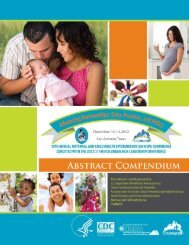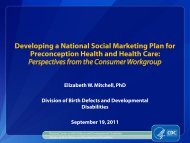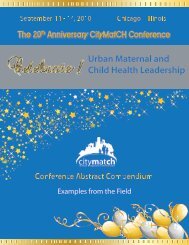Conference Abstract Compendium Examples from the ... - CityMatCH
Conference Abstract Compendium Examples from the ... - CityMatCH
Conference Abstract Compendium Examples from the ... - CityMatCH
You also want an ePaper? Increase the reach of your titles
YUMPU automatically turns print PDFs into web optimized ePapers that Google loves.
2009 <strong>CityMatCH</strong> Urban MCH Leadership <strong>Conference</strong>ACCOMPLISHMENTS/RESULTSThe MDTF developed three subcommittees to address <strong>the</strong> priorities identified: Resource List; Outreach &Education, and Wait Time Studies. The Resource group developed two service provider directories – onefor consumers and one for healthcare professionals. The Outreach group developed a PowerPointeducation tool for healthcare professionals and organized two trainings to occur in April and June, 2009.The objectives of <strong>the</strong> trainings are to: discuss symptoms and occurrence of Perinatal Mood Disorders(PMD); identify screening tools used to identify Maternal Depression; list treatment options for PMD;and, identify resources for PMD. The Wait Time group conducted a baseline wait time study in 2008 andwill conduct subsequent studies in 2009.BARRIERSWhile we detect possible depression through a proactive screening process, <strong>the</strong> next steps of referral andtreatment are a serious challenge. Mental health referral sources for maternal depression are few andmo<strong>the</strong>rs referred experience delays in getting necessary services. Additional barriers identified included:lack of resource awareness; overburdened resources and long wait times; fear of stigma; continuity ofcare; lack of cultural competency and bilingual services; low appointment show rates; lack of compliancewith treatment plan; limited screenings; and lack of transportation.LESSONS LEARNED• Our local data are compelling and underscore <strong>the</strong> lack of community resources available for screeningand treating depression for high risk mo<strong>the</strong>rs.• Data highlight a critical community need for a mental/behavioral health partnership that can respondquickly and effectively to maternal depression.• Untreated depression complicates our efforts to help moms achieve good birth outcomes.• There’s an important role for health department leadership in group facilitation, coordination ofintervention, and outcome evaluation.INFORMATION FOR REPLICATION• Approximate annual budget is contracted for $5,500.00.• Resources: Utilize National Healthy Start funding to cover program planning, development andresources; additional resources include in-kind contribution <strong>from</strong> task force members, including personneltime to participate in planning meetings and providing space.• Key partners and stakeholders include <strong>the</strong> following task force members: Catholic Social Services;Columbus Neighborhood Health Centers; Columbus Public Health; Council on Healthy Mo<strong>the</strong>rs &Babies; Dublin Counseling Center; Mount Carmel Health System; Nationwide Children’s Hospital;Northwest Counseling Services; Ohio Department of Health; OhioHealth; Ohio State University; OSUMedical Center; and POEM, Inc.52







